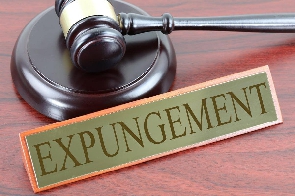The fate of the Member of Parliament for Assin North, James Gyakye Quayson, on whether he can continue to carry himself as a parliamentarian was decided on Wednesday, May 17, 2023.
On that day, a seven-member panel of the Supreme Court ordered parliament to expunge the name of James Gyakye Quayson as a Member of Parliament.
In the ruling, the apex court barred James Quayson from holding himself as a Member of Parliament.
The National Democratic Congress (NDC) MP, James Gyakye Quayson, was standing trial for counts of deceit of a public officer, forgery of a passport, knowingly making a false statutory declaration, perjury, and false declaration.
Justice Jones Victor Dotse, Justice Nene Amegatcher, Justice Mariama Owusu, Gertrude Araba Torkornoo, Justice Prof. Henrietta Mensa-Bonsu, Justice Yonny Kulendi, and Justice Barbara Ackah-Yensu declared that James Quayson was not qualified at the time he contested the 2020 election.
In the ruling of the court, it said the name of the NDC MP should be expunged. GhanaWeb brings to its readers what the laws of Ghana says about the term ‘expungement.’
The following details are culled from bpaghana.com.
What is the expungement of criminal records?
In law, “expungement” is the process by which a record of criminal conviction is destroyed or sealed from the public record.
An expungement order directs the court to treat the criminal conviction as if it had never occurred, essentially removing it from a defendant’s criminal record as well as, ideally, from the public record.
To qualify for expungement, two essential conditions must be satisfied viz, the offence in question must attract a non-custodial sentence or sentence of imprisonment not exceeding five years, and the person in question must not have had any other convictions during a specified period referred to as the “rehabilitation period.”
A case for Expungement in Ghana
Expungement has limited applicability in the criminal justice system of Ghana. In its strictest sense, it only applies to juvenile offenders within a very limited scope. The statutory provisions on expungement in Ghana are found in the Juvenile Justice Act, 2003 (Act 653).
The law provides that an application may be made by a juvenile offender, probation officer or a close relative of a juvenile for the record of conviction and order imposed on the juvenile to be expunged.
The following requirements are to be satisfied before an order may be made by the Juvenile Court:
(a) the application must be made at least five years after the juvenile offender completes a non-residential sentence made by the court and the court must be satisfied that the juvenile offender has not been convicted of an offence during the five-year period.
(b) Where the juvenile was committed to a correctional centre by a residential order from Court, the application may be made, at least ten years after the order has been completed by the juvenile offender and the court must be satisfied that the juvenile offender has not been convicted of an offence during those ten years.
In terms of the record of a formal caution of a juvenile kept in the register at the Police Station, a person needs not make an application for its expungement. Such records are required to be expunged after a period of five years from the date on which the caution was entered.
However, the law excludes records of serious offences from the list of offences that can be expunged. Such serious offences unsurprisingly, include murder, rape, defilement, indecent assault involving unlawful harm, robbery with aggravated circumstances, drug offences and offences related to firearms.
Meanwhile, watch the latest episode of #SayItLoud on GhanaWeb TV below:
You can also watch the latest episode of People & Places here
Share your news stories and ideas with GhanaWeb

To advertise with GhanaWeb

AE/OGB
General News of Thursday, 18 May 2023
Source: www.ghanaweb.com

















